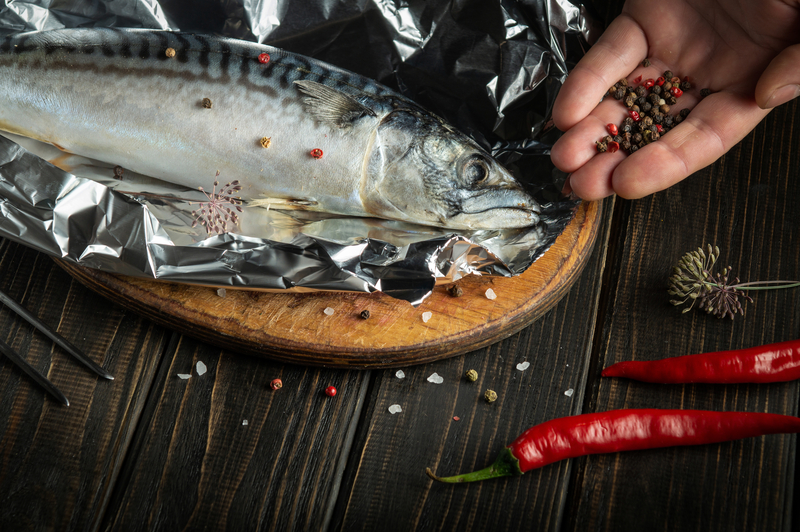 Baking fish is a popular cooking method that allows you to achieve a tender and flavorful result without the need for excessive oil or frying.
Baking fish is a popular cooking method that allows you to achieve a tender and flavorful result without the need for excessive oil or frying.
When it comes to baking fish, one question frequently arises: does it cook faster when covered or uncovered?
The answer depends on several factors, including the type of fish, the recipe, and your desired outcome.
In this article, we’ll explore the pros and cons of both covering and uncovering fish during the baking process to help you make an informed decision.
The Role of Covering in Baking
Covering fish during the baking process involves using foil, a lid, or any suitable cover to encase the fish while it cooks.
This method affects the cooking environment and can influence the final result.
- Covered
Baking fish with a cover, such as foil or a lid, helps to retain moisture.
The cover traps steam, preventing the fish from drying out during the cooking process.
This is particularly useful for lean fish varieties like cod or haddock, which can easily become dry if overcooked.
- Uncovered
Baking fish uncovered can lead to some moisture loss as the steam escapes.
However, this method can be desirable if you want to achieve a crispy or golden-brown exterior, as it allows the surface to dry out slightly and develop a crust.
Thin vs. Thick Fillets
 The decision to bake fish covered or uncovered can also depend on the thickness of the fish fillet.
The decision to bake fish covered or uncovered can also depend on the thickness of the fish fillet.
- Thin Fillets
For thin fillets, such as those from flounder or tilapia, baking uncovered is often the preferred method.
Thin fillets cook quickly, and leaving them uncovered allows for a quicker sear or crust development on the outside, while the fish remains moist inside.
- Thick Fillets or Whole Fish
Thicker fish fillets, like salmon or halibut, benefit from being covered during baking.
The cover helps maintain a moist interior by trapping steam, preventing the fish from drying out while ensuring thorough cooking.
This method is also suitable when baking whole fish, ensuring that the entire fish cooks evenly.
Recipe and Flavor Considerations
- Covered for Flavors
If your recipe involves adding a sauce or marinade to the fish, baking it covered can be advantageous.
The cover helps lock in the flavors, allowing the fish to absorb the sauce or marinade more effectively, resulting in a more flavorful dish.
- Uncovered for Texture
When texture is your priority, baking fish uncovered can provide the desired results.
This method allows the surface of the fish to crisp up and develop a pleasing texture, which can be especially appealing for dishes like Parmesan-crusted fish.
- Personal Preference
Ultimately, whether you choose to bake fish covered or uncovered depends on your personal preferences and the specific outcome you want to achieve.
- Covered for Moisture and Tenderness
If you prefer your baked fish to be moist, tender, and evenly cooked throughout, covering it is a safe bet.
Covered baking ensures that the fish remains succulent, making it a suitable choice for those who favor a softer texture.
- Uncovered for Texture and Appearance
On the other hand, if you’re all about achieving a crispy, visually appealing crust on your baked fish, then baking it uncovered is the way to go.
The exposed surface of the fish will brown and develop a delightful texture and appearance.
Bottom Line – Does Fish Bake Faster Covered or Uncovered?
 Whether fish bakes faster covered or uncovered ultimately depends on various factors, including the type of fish, its thickness, the recipe, and your personal preferences.
Whether fish bakes faster covered or uncovered ultimately depends on various factors, including the type of fish, its thickness, the recipe, and your personal preferences.
In general, covering fish during baking helps retain moisture and is ideal for lean or thick fillets, as well as when using sauces or marinades.
Uncovered baking, on the other hand, provides a crispy texture and is perfect for thin fillets or when a crusty exterior is desired.
Experimentation is key to perfecting your baked fish dishes.
Try both methods to see which one suits your taste and recipe best, and remember to monitor the cooking process to ensure your fish reaches the desired level of doneness without overcooking or drying out.
Whether covered or uncovered, baking fish can yield delicious results when done with care and attention.


